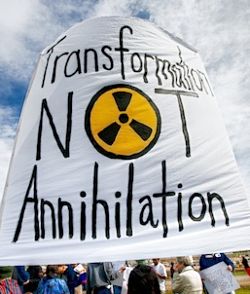 The nuclear bomb America dropped on Hiroshima on August 6, 1945, instantly killed over 65,000 people and injured about 70,000 others. Also, the bomb flattened buildings and destroyed about 70% of Hiroshima's infrastructure. Hiroshima was a thriving Japanese city with a population of about 255,000 people.
The nuclear bomb America dropped on Hiroshima on August 6, 1945, instantly killed over 65,000 people and injured about 70,000 others. Also, the bomb flattened buildings and destroyed about 70% of Hiroshima's infrastructure. Hiroshima was a thriving Japanese city with a population of about 255,000 people.
Another nuclear bomb dropped on Negasaki, another Japanese city, 3 days later on August 9, 1945, instantly killed about 39,000 people and injured over 25,000 others.
The Uranium bomb America dropped on Hiroshima on August 6, 1945 had an explosive yield equal to about 15000 tonnes of TNT. It may surprise you to know that most nuclear warheads today are thousands of times more power than that devastating nuclear bomb America dropped on Hiroshima.
There are currently over 12,700 nuclear warheads in the world of which about 9,400 are in active military stockpiles ready for battle. Each of these 12,700 nuclear warheads could be 1000s of times more powerful than the one America dropped on Hiroshima.
Currently, 9 countries in the world have nuclear weapons with Russia having the most. Russia is home to about 5889 nuclear warheads followed by the United States with about 5224 nuclear warheads. China has about 410. France has about 290 followed by the United Kingdom with about 225. Pakistan and India are home to 170 and 164 respectively. Israel currently has 90 nuclear warheads while North Korea is home to about 30.
Although Italy, Turkey, Germany, Belgium, and the Netherlands do not currently have nuclear weapons of their own, these nations host some American nuclear warheads. Also, Russia's neighbor, Belarus, may be hosting some Russian warheads.
As you can see, there is no African nation on this list. However, it hasn't always been so. In fact, South Africa, Egypt, Libya, etc. could be home to several nuclear warheads today if not for the sake of peace in the world.
South Africa had a very successful nuclear program. In fact, between 1940 and 1990, the then Apartheid South African government engaged in research and development of nuclear and other weapons of mass destruction. However, in 1989, South Africa decided to let go of its nuclear program which made South Africa the only country in the world to achieve nuclear weapon capability and voluntarily relinquish it. Not just that, in 1993, South Africa also voluntarily ended its biological, chemical and missile programs.
Libya had a successful nuclear program too and had to abandon it in 2003. Egypt also had a nuclear program in the 1950s and 60s. In fact, Egypt even acquired some nuclear reactors from the Soviet Union in 1958. However, just like South Africa and Libya, Egypt too abandoned its nuclear program.
Africa today has no nuclear weapons. Some may argue it is bad for Africa as a continent to have no nuclear weapons considering how crazy the world is becoming. Some even argue Russia would dare not invade and bully Ukraine had Ukraine not abandoned its nuclear program. The truth however is that, nuclear wars can never be won and should never be fought. Any nuclear weapon dropped at some corner of the world, affects the entire planet in one way or the other.
Africa could be home to several nuclear warheads today. Instead, Africa chose the path of peace. Today, all African nations, with the exception of South Sudan, are members of the Treaty on the Non-Proliferation of Nuclear Weapons. Not just that, The African Nuclear-Weapon-Free Zone Treaty which entered into force on July 15, 2009 is still very active and prohibits the research, development, manufacture, stockpiling, acquisition, testing, possession, control or stationing of nuclear weapons, as well as the dumping of radioactive wastes.
The African Nuclear-Weapon-Free Zone Treaty, popularly known as the "Pelindaba Treaty", also prohibits any attack against nuclear installations in the zone by Treaty parties and requires them to maintain the highest standards of physical protection of nuclear material, facilities and equipment, which are to be used exclusively for peaceful purposes.
So as you can see, Africa is on the right path. Instead of spending billions of dollars researching and developing weapons with the capability to destroy the world and everything in it, maybe the rest of the world should learn a thing or two from Africa and help save the planet.
